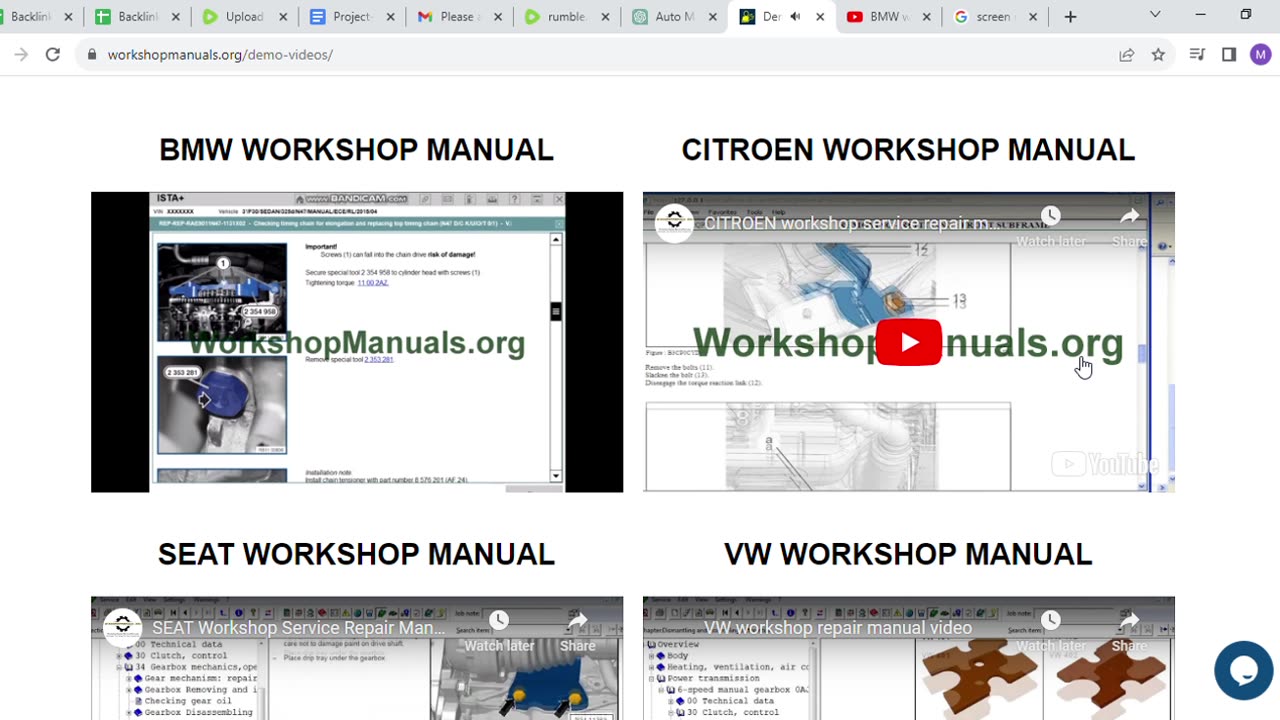Premium Only Content

The Indispensable Guide to Workshop Manuals: Unlocking the Secrets of Automotive Mastery
Introduction:
WORKSHOPMANUALS , often considered the unsung heroes of the automotive world, play a crucial role in empowering both amateur enthusiasts and seasoned mechanics with the knowledge required to navigate the intricacies of vehicle repair and maintenance. These manuals are comprehensive guides that delve into the inner workings of various automotive systems, providing step-by-step instructions and invaluable insights. In this article, we will explore the significance of workshop manuals, their evolution over the years, and the myriad ways they contribute to the mastery of vehicle maintenance.
more....web :https://downloadworkshopmanuals.com/
I. The Evolution of Workshop Manuals:
The genesis of workshop manuals can be traced back to the early days of the automotive industry when vehicles were simpler, and repair needs were relatively straightforward. As automobiles grew more complex, so did the need for detailed documentation to aid in diagnostics, repairs, and routine maintenance. The evolution of workshop manuals parallels the technological advancements in the automotive sector, encompassing everything from basic mechanical systems to intricate electronic components.
In the early 20th century, workshop manuals were primarily print publications, often generic and limited in scope. With the advent of the internet and digital technologies, manuals became more accessible and dynamic. Online platforms now offer a vast repository of workshop manuals for a wide range of vehicles, making it easier for enthusiasts and professionals alike to access the information they need.
II. The Components of Workshop Manuals:
Workshop manuals are comprehensive documents that cover various aspects of vehicle maintenance and repair. They typically include the following components:
Introduction and General Information:
Overview of the vehicle model and its specifications.
Safety precautions and guidelines for working on the vehicle.
Technical Specifications:
Detailed technical data, including engine specifications, torque settings, and fluid capacities.
Maintenance Procedures:
Regular maintenance tasks such as oil changes, filter replacements, and brake inspections.
Scheduled service intervals and checklists.
Diagnostic Procedures:
Step-by-step guides for identifying and troubleshooting issues.
Diagnostic trouble codes (DTCs) and their meanings.
Repair Instructions:
In-depth guidance on repairing various components, from the engine and transmission to electrical systems.
Exploded diagrams and illustrations to aid in the disassembly and reassembly of parts.
Wiring Diagrams:
Schematics illustrating the electrical wiring of the vehicle.
Essential for diagnosing electrical issues.
Technical Service Bulletins (TSBs):
Updates and information from the manufacturer regarding common issues and solutions.
A valuable resource for staying informed about known problems.
III. The Importance of Workshop Manuals:
Empowering DIY Enthusiasts:
Workshop manuals serve as an indispensable tool for those who enjoy working on their vehicles. They empower enthusiasts to undertake a wide range of repairs and modifications with confidence.
Reducing Dependence on Dealerships:
With access to workshop manuals, vehicle owners can reduce their reliance on dealerships for routine maintenance and minor repairs. This not only saves money but also fosters a sense of independence.
Professional Guidance for Mechanics:
For professional mechanics, workshop manuals are essential for efficiently diagnosing and repairing a variety of issues. They serve as a reference point for best practices and industry standards.
Enhancing Technological Literacy:
As vehicles become more technologically advanced, workshop manuals contribute to enhancing the technological literacy of both amateurs and professionals. They provide insights into cutting-edge automotive systems and their functionalities.
Time and Cost Efficiency:
Workshop manuals streamline the repair process, helping mechanics and enthusiasts save time by providing clear, organized instructions. This efficiency translates to cost savings for both individuals and repair shops.
IV. Challenges and Innovations in Workshop Manuals:
Complexity of Modern Vehicles:
As vehicles incorporate more advanced technologies, workshop manuals must evolve to address the complexities of electronic systems, sensors, and software. Keeping up with rapid advancements is a continuous challenge.
Access to Up-to-Date Information:
Timely access to the latest workshop manuals is crucial, especially with the frequent updates and modifications made by manufacturers. Online platforms that provide real-time updates help address this challenge.
Integration of Multimedia:
The integration of multimedia elements, such as videos and interactive diagrams, can enhance the learning experience. Innovations in digital workshop manuals allow for a more immersive and engaging educational journey.
User-Friendly Interfaces:
The accessibility of workshop manuals is greatly improved when they feature user-friendly interfaces. Intuitive navigation, search functionalities, and cross-referencing contribute to a more efficient user experience.
V. The Future of Workshop Manuals:
The future of workshop manuals is undoubtedly tied to the continued evolution of automotive technology. As vehicles become more connected, automated, and electrified, workshop manuals will need to adapt accordingly. Here are some trends shaping the future of these essential guides:
Augmented Reality (AR):
AR technology holds the potential to revolutionize the way mechanics and enthusiasts interact with workshop manuals. Imagine overlaying repair instructions onto the actual vehicle through AR glasses, providing a hands-free and immersive experience.
Artificial Intelligence (AI) Integration:
AI can play a role in predictive maintenance, helping vehicle owners and mechanics anticipate issues before they occur. Workshop manuals may incorporate AI-driven diagnostics and recommendations for enhanced troubleshooting.
Collaborative Platforms:
Online platforms that facilitate collaboration among mechanics, enthusiasts, and even manufacturers can foster a sense of community. This collaborative approach can lead to the collective improvement of repair techniques and shared knowledge.
Blockchain for Security and Authenticity:
Blockchain technology can be employed to ensure the security and authenticity of workshop manuals. This would prevent unauthorized modifications and guarantee the integrity of the information provided.
VI. Conclusion:
In the ever-evolving landscape of automotive technology, workshop manuals remain indispensable tools for individuals and professionals alike. From empowering DIY enthusiasts to aiding seasoned mechanics in navigating the complexities of modern vehicles, these manuals bridge the gap between passion and expertise. As we look to the future, the integration of cutting-edge technologies such as AR, AI, and blockchain promises to elevate the utility and accessibility of workshop manuals, ensuring they continue to be invaluable resources for automotive enthusiasts and professionals worldwide. Whether in print or digital form, the workshop manual stands as a beacon of knowledge, guiding us through the intricacies of the vehicles we cherish and rely on.
-
 3:56:39
3:56:39
Alex Zedra
8 hours agoLIVE! New Game | The Escape: Together
58.3K9 -
 5:01:11
5:01:11
FreshandFit
9 hours agoJoe Budden Arrested For Being A Perv! Tesla Cybertruck Explosion
92.3K18 -
 2:08:45
2:08:45
Kim Iversen
12 hours agoNew Year, New PSYOP?: The Fort Bragg Connection In The New Years Terror Attacks
76.6K171 -
 1:41:18
1:41:18
Glenn Greenwald
11 hours agoTerror Attacks Exploited To Push Unrelated Narratives; Facing Imminent Firing Squad, Liz Cheney Awarded Presidential Medal | SYSTEM UPDATE #381
108K185 -
 1:00:32
1:00:32
Man in America
13 hours ago🔴 LIVE: Terror Attacks or False Flags? IT DOESN'T ADD UP!!!
78.2K26 -
 1:02:38
1:02:38
Donald Trump Jr.
15 hours agoNew Year’s Terror, Latest Breaking News with Sebastian Gorka | TRIGGERED Ep.204
208K438 -
 59:59
59:59
The StoneZONE with Roger Stone
10 hours agoAfter Years of Targeting Trump, FBI and DOJ are Unprepared to Stop Terror Attacks | The StoneZONE
70.2K28 -
 1:26:42
1:26:42
Leonardaisfunny
8 hours ago $5.18 earnedH-1b Visas: Infinity Indians
46.5K27 -
 1:08:33
1:08:33
Josh Pate's College Football Show
13 hours ago $2.95 earnedPlayoff Reaction Special: Ohio State Owns Oregon | Texas Survives | UGA vs Notre Dame Takeaways
42K6 -
 58:04
58:04
Kimberly Guilfoyle
13 hours agoFBI's Terror Response Failures, Live with Steve Friend & Kyle Seraphin | Ep. 185
115K48